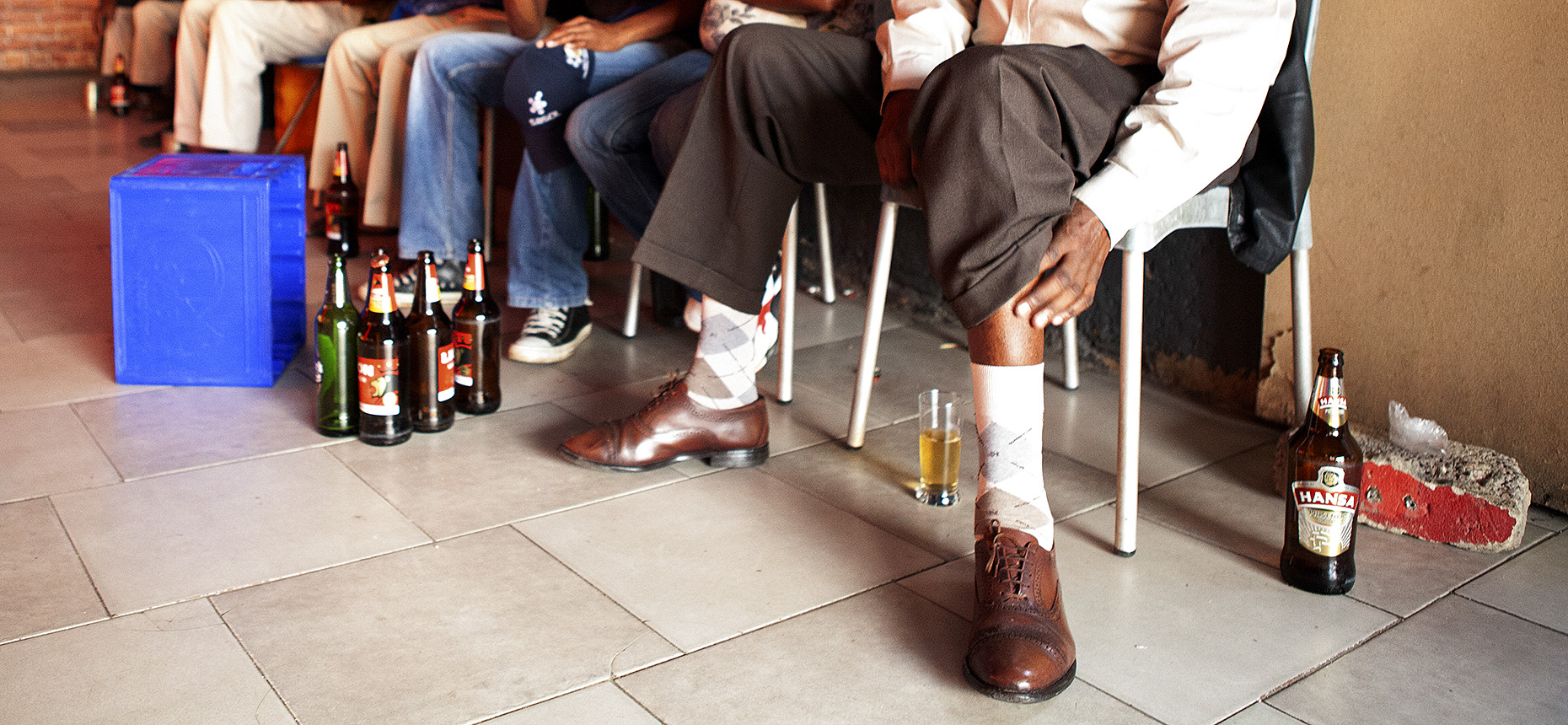“Sometimes you cut open a body and you can smell the alcohol coming from the stomach – it reeks,” says Dr Gina Rowe.
Rowe is a pathologist at the Roodepoort mortuary, along the western fringe of Joburg. It’s her job to determine cause of death. Among the procedures on her checklist is the requirement to perform blood alcohol tests on every adult body she examines – every single one.
“We test everybody because there’s just such a high prevalence of alcohol in cause of death,” she says.
Rowe doesn’t drink herself, but she is more sad than judgmental, she says, when alcohol toxicity reflects in the notes she makes before handing over a body for cremation or burial.
“It is a waste of life, but when I think about why people drink so much, I know it’s because there is rot in society, and alcohol as our most abused drug is a plaster for problems for many people.”
Rowe says lockdown levels 4 and 5, with their ban on alcohol sales, saw a dramatic drop in the number of bodies arriving at the morgue from vehicle crashes, shootings and stabbings.
“It was great because it was so quiet. The numbers we were seeing were down by at least 40%. We saw them climb again with Level 3, when everyone could replenish their alcohol stocks. Of course, there were other reasons, like the curfew or that people weren’t out socialising. But the alcohol ban was definitely a contributing factor,” she says.
•••
Lockdown with its unprecedented firsts has been a unique lens to examine just how intimately alcohol runs through the story of human beings – whether we are part of the 40-odd percent of male or 20-odd percent of female drinkers in the country, according to the World Health Organisation, or the majority who abstain for at least 12 months at a time.
Alcohol pulls a liquid thread through politics, money and social code; through life, and also death. It’s there as glasses clink for milestones of new life, birthdays, weddings, wakes and after-tears. It’s what we keep secrets about, judge with contempt, or what we claim as war stories of wasted weekends.
Alcohol frames religions and cultures – abstinence is piety for some while others sip wine as receiving the blood of Christ. Libations at altars honour ancestors, and precious drops are splashed on the ground, meant to reach with mortal longing the thirsty dead beneath our feet.
Archaeologists say around 9,000 years ago early humans abandoned nomadic, hunter-gatherer ways to domesticate crops. Fermentation of grains became beer, and settling down long enough for it all to happen meant new configurations of ordered life from which civilisations emerged.
Through the ages, alcoholic drinks have been a substitution for nutrition and a welcome alternative to drinking polluted water in cities without sanitation. Now in 2020, alcohol in its 70% hand sanitiser form is what scientists say is a lifesaving protective barrier against coronavirus infection.
•••
Like most drinkers, Dali Maleyile, 31, enjoys the “feel-good” rush of endorphins from a beer or two. But alcohol is also this other thing for him, difficult to untangle from the memories of a winter of tragedy back in 2013.
The story he tells begins with the sun setting in Nqileni village in the Eastern Cape. He remembers lagging some distance behind his eldest brother, Xolani, who was with a group of young men walking to their village, returning from an initiation ceremony.
“They met with a group of boys from another village on the way. They had all been drinking, including my brother, and a fight started. My brother was stabbed and by the time I got to him he was dead,” says Maleyile.
“My brother was this quiet person, someone who would not have been in a fight. He was my hero. Maybe things would have been different if they weren’t all drunk that evening.”
His village has tried community-driven approaches to curb drinking. One initiative has been getting local shebeens to close by 19h00, even outside current lockdown rules. Maleyile says it has helped bring down crime and fighting, but he’s aware that the availability of booze is just one aspect of changing a drinking culture which, in South Africa, has tipped towards the toxic.
“We must find a way because this thing with drinking when people don’t know what is enough becomes something else,” Maleyile says.
•••
Professor Susan Levine, a medical anthropologist at the University of Cape Town, says drinking culture and South African’s relationship with booze is complex and comes with some hard truths.
One example she points to is the “dop system”, which was a previous research focus of hers. Payment with cheap wine for labour was prevalent for generations on Western Cape wine farms until it was outlawed in 2003.
“When I asked young people on the farms what they wanted to be when they grew up, every one of them said ‘to be sober’,” Levine recalls.
She adds: “Alcohol has been a way to control labour and to control populations and this comes against the backdrop of massive alcohol dependency and high levels of violence in the country.”
Levine says the lockdown booze ban has shown up the burdens of our histories and inequalities. She says even in this time of prohibition, those with wealth and access “know a gin contact”. Others profit off their lockdown side hustle. Some, though, have run out of money for the basics, never mind black market mark-ups. And there are people going through alcohol withdrawal in a country with weak support and care for alcohol dependency.
•••
Changing societal norms around drinking culture means infrastructure and safety nets need to be in place, she says. It’s everything from dependency support programmes; better night-time public transport to curb drink-driving; actual policing to make consequences real, and incentives for pub and tavern owners to sell less and still survive.
For most tavern owners it’s a struggle to survive, says Lucky Ntimane, convenor of the National Liquor Traders Council. He says another hard truth is that manufacturers hold unequal sway over small tavern owners through pricing or withholding business support. It leaves tavern owners in “a volumes game”.
Ntimane says taverns should be businesses before they are social hubs pushing product. Reshaping business models holds for him the opportunity for tavern and pub owners to be “ambassadors” who can set limits for patrons who have had one too many.
“South Africans do have a bad relationship with liquor. There are many reasons for this, from poverty, unemployment and the issues government shies away from, like land redistribution. In a place like Alex township, you walk out of your front door and you are already standing in your neighbour’s home.
“But I don’t believe anyone opens up a bottle of liquor with the intention of doing themselves harm,” he says.
Zandile Madzena owns a tavern in Finetown, near Ennerdale in Gauteng. Over her 15 years in business, she’s seen many a drinker through her doors. The liquor trade is how the single mom put two children through school and one through tertiary education. She’s also been able to take care of extended family and is an employer.
“I’ve never had the police come outside my tavern at 03h00 because of a fight or something,” she says.
Madzena’s approach is no loud music, no young people allowed, having bouncers on hand and maintaining good relationships with her neighbours and community. Finding her distinctive business model has worked. She’s kept her patrons and kept the peace.
Establishing new normals, such as Madzena has done at her tavern, comes with people experiencing something different, says neuroscientist Dr Sahba Besharati of Wits University’s Psychology department. She says that South Africans, for example, are accustomed to a pint as the standard size of a beer, but in many European countries, beer is served in much smaller glasses as the norm.
New experiences can change our minds, but she says making significant lifestyle choices takes decision-making and willpower, which are complex brain processes. Add to this, variables of emotions, genetics, social and cultural conditioning, and even gender, age and body size, and it gets tougher.
Besharati adds: “Lockdown as a period of high stress for everyone is unlikely the time people will look to change their drinking behaviour. So if you are drinking to cope, you’ll probably continue to do so, even if it may be a maladaptive coping strategy in the long run.”
For Karl* (full identity withheld) alcohol’s long run reached its end point for him six years ago. Before then he had earned himself the nickname the “Mayor of Melville” for being a seemingly permanent fixture in the high street bars of the Joburg suburb.
“I was a social drinker. I never drank alone, so I would go out, see friends and drink,” he says.
One time he was stabbed and robbed as an inebriated easy target. Most nights he got home on a magic carpet of brain fog and bloody good luck. He says he could spend whole nights chatting to someone only to embarrassingly reintroduce himself the next time he met them.
“You get used to being hungover all the time and you start thinking it’s normal. But the drinking was taking away my energy, my time and it cost me a lot of money,” he says.
His first month of sobriety gave him newfound vitality, clarity and time to do more than recover from nights of binge drinking, so he’s stuck it out.
Quitting booze has cost him friends. He says: “There’s a macho thing that goes with drinking, so you drink. But there’s also a negative association with quitting because people assume something must have gone bad.
“It’s different for everyone, but there’s no sad story in my case. It’s just that I feel so much better not drinking and now I know I don’t need it,” he says.
There’s room for personal and collective responsibility in reshaping our drinking culture. Levine calls this tussle of individual freedoms versus the common good “our ethics of care beyond ourselves”.
It’s not the last word or the silver bullet to a healthier relationship with booze. But a lockdown lens to see “beyond ourselves” may help to reflect on solutions that are better than shaming, finger-wagging, bans and government getting to play Big Brother again. DM/MC
Update on 1 April, 2022: At the 2022 Diageo SA Responsible Drinking Media Awards on 31 March, Ufrieda Ho received top honour in the Best Online category for this article.





